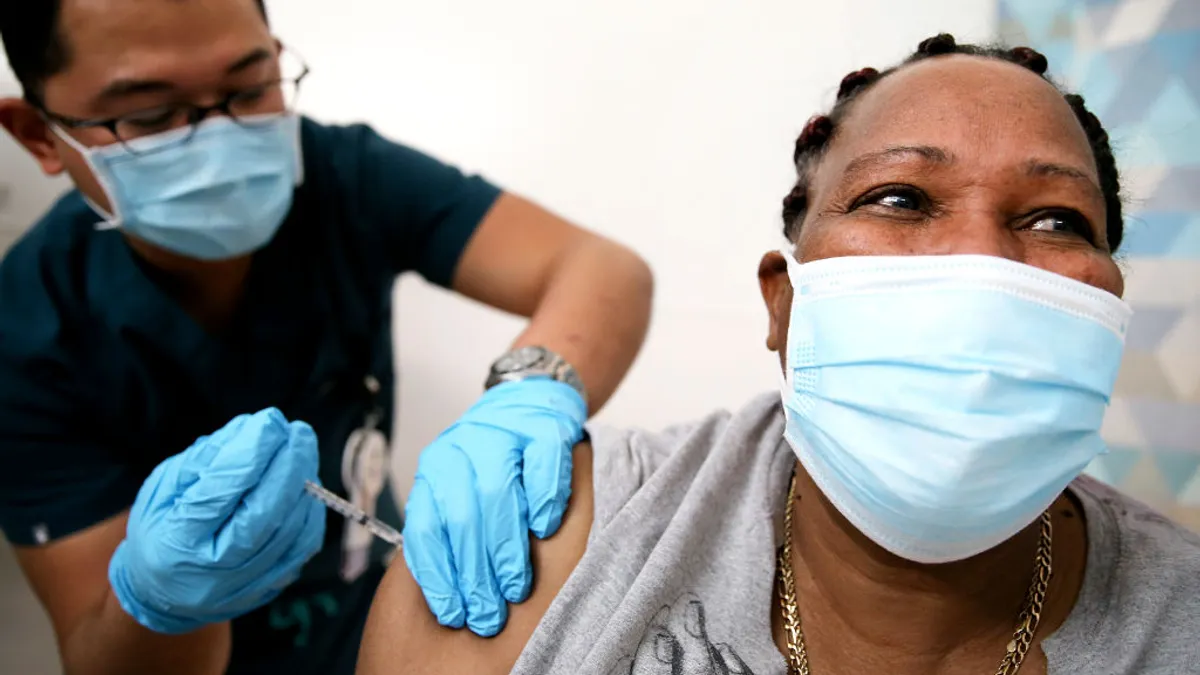Victor Strecher is the founder and CEO of Kumanu, a next-generation well-being company, a professor at the University of Michigan School of Public Health, a renowned speaker and an author.
The delta variant surge is a stark reminder we're still in a fight against COVID-19 and organizations once again are on the front line. Many large companies like Disney and Walmart already require employees to get vaccinated. But with national vaccination rates slowing, President Biden has increased the stakes for organizations to get their holdout employees vaccinated.
What's a key to minimizing vaccine hesitancy at your organization?
According to new research conducted by several university researchers and our company, Kumanu, a key to increasing the vaccination rate is a strong sense of purpose. In a July 2021 study, we found that a sense of purpose predicted a greater willingness to get vaccinated, even when accounting for demographic factors, political affiliation and psychological well-being.
How does a sense of purpose influence someone's willingness to get vaccinated? And what does this mean for HR leaders — especially at companies already mandating vaccinations as part of their safety protocols?
Defining sense of purpose and future orientation
To understand the results of this study, it's helpful to dig into the concepts of sense of purpose and future orientation, and explore how these ideas coexist. Sense of purpose is defined as the motivation that drives someone toward a satisfying future, while future orientation is defined as the ability to set future goals and plans. Years of research show that people who have a strong sense of purpose tend to also have a stronger future orientation.
Since our recent findings suggest a sense of purpose in life predicts a greater willingness to receive the COVID-19 vaccination, sense of purpose becomes an important factor for organizations that want to safely return to the office.
How future orientation influences well-being
The idea that positive health outcomes are associated with future orientation is not unique to COVID-19 research. For years, multidisciplinary research has linked greater future orientation with improved health and educational outcomes, asserting that many preventive strategies — like contraception and exercise — are done to avoid unwanted or negative future consequences. Adding to this, current neuroscience research reveals correlations between purpose in life and positive health outcomes, finding a high purpose "has been linked to the pursuit of community-oriented goals, as well as to higher levels of physical activity."
If we know that future-oriented people invest more in their own future, including their health, how does this tie to the COVID-19 vaccination?
The correlation between purpose and vaccination
In our July 2021 study, exploratory analyses revealed that adults with a stronger sense of purpose viewed the COVID-19 vaccine as important for three main reasons: (1) a return to daily activities; (2) their own health; and (3) others' health. This could mean that purposeful individuals are more willing to get vaccinated because they understand how mass vaccination and herd immunity promote a common purpose, as well as their own purpose.
In another 2021 study, primarily aimed at measuring the impact of misinformation on vaccination intent, researchers found that folks were 6% more willing to get the vaccine if they were told it protected others; they were asked, "... would you accept the vaccine if it meant protecting friends, family, or at-risk groups?"
If you can tie the scientific impact of mass vaccination into a common, organizational purpose, your organization may be more successful in helping your people overcome their vaccine hesitancy. Neuroscience studies and researchers across disciplines agree that purpose — at an individual level — really matters. And our research backs this up because it shows that purpose has a strong positive association with the intent to get vaccinated for COVID-19.
How HR leaders can leverage this research
These findings are good news for companies that want to encourage a return to the workplace, especially for organizations mandating vaccinations. But how can you cultivate and activate a stronger sense of purpose in your people? Here are two specific strategies.
Purpose-centric writing prompts
Past research shows that people's sense of purpose can be influenced by having them complete writing prompts. If you want to replicate this at your organization, HR could design a campaign that encourages people to reflect on purposeful activities from pre-pandemic life. For instance, you could ask your people to respond to a prompt like, "What are you looking forward to most about returning to the workplace (or a hybrid arrangement)?" In collaboration with internal communications, HR can then incorporate these purpose-centered stories into newsletters and benefits materials.
Intentional and altruistic messaging
Research also shows that people respond best to altruistic messaging regarding COVID-19. For example, when comparing the impact of two versions of a similar message, (1) "Wash your hands more often for 20 seconds," versus (2) "Protect vulnerable older people by washing your hands more often for 20 seconds," effectiveness increased from 54% to 62% when referencing "vulnerable older people." In effect, altruistic messaging can illuminate and connect employees with a greater purpose. As an HR and wellness leader, how can you incorporate a sense of purpose into your messaging around the COVID-19 vaccination?
The role of wellness leaders
Since the pandemic began, many organizations have been cultivating a sense of purpose in their people, whether consciously or not. Shifting safety protocols have required purposeful action within organizations — things like proper hand-washing, social distancing and a renewed focus on caring for the well-being of people. As an HR leader, your work continues as you engage with your people and remind them of their purpose.
Because our research links a sense of purpose with a greater willingness to get vaccinated, your communications efforts have the power to minimize vaccine hesitancy and make a return to the workplace safer. When you foster purpose inside of your people, you keep them focused on what matters.





















